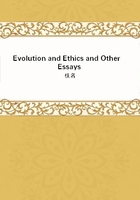
第27章
But when the focus of Greek intellectual activity shifted to Athens, the leading minds concentrated their attention upon ethical problems. Forsaking the study of the macrocosm for that of the microcosm, they lost the key to the thought of the great Ephesian, which, I imagine, is more intelligible to us than it was to Socrates, or to Plato. Socrates, more especially, set the fashion of a kind of inverse agnosticism, by teaching that the problems of physics lie beyond the reach of the human intellect; that the attempt to solve them is essentially vain; that the one worthy object of investigation is the problem of ethical life; and his example was followed by the Cynics and the later Stoics. Even the comprehensive knowledge and the penetrating intellect of Aristotle failed to suggest to him that in holding the eternity of the world, within its present range of mutation, he was making a retrogressive step. The scientific heritage of Heracleitus passed into the hands neither of Plato nor of Aristotle, but into those of Democritus. But the world was not yet ready to receive the great conceptions of the philosopher of Abdera.
It was reserved for the Stoics to return to the track marked out by the earlier philosophers; and, professing themselves disciples of Heracleitus, to develop the idea of evolution systematically. In doing this, they not only omitted some characteristic features of their master's teaching, but they made additions altogether foreign to it.
One of the most influential of these importations was the transcendental theism which had come into vogue. The restless, fiery energy, operating according to law, out of which all things emerge and into which they return, in the endless successive cycles of the great year; which creates and destroys worlds as a wanton child builds up, and anon levels, sand castles on the seashore; was metamorphosed into a material world-soul and decked out with all the attributes of ideal Divinity; not merely with infinite power and transcendent wisdom, but with absolute goodness.
The consequences of this step were momentous. For if the cosmos is the effect of an immanent, omnipotent, and infinitely beneficent cause, the existence in it of real evil, still less of necessarily inherent evil, is plainly inadmissible.Yet the universal experience of mankind testified then, as now, that, whether we look within us or without us, evil stares us in the face on all sides; that if anything is real, pain and sorrow and wrong are realities.
It would be a new thing in history if a priori philosophers were daunted by the factious opposition of experience; and the Stoics were the last men to allow themselves to be beaten by mere facts. "Give me a doctrine and I will find the reasons for it," said Chrysippus. So they perfected, if they did not invent, that ingenious and plausible form of pleading, the Theodicy; for the purpose of showing firstly, that there is no such thing as evil; secondly, that if there is, it is the necessary correlate of good; and, moreover, that it is either due to our own fault, or inflicted for our benefit. Theodicies have been very popular in their time, and I believe that a numerous, though somewhat dwarfed, progeny of them still survives. So far as I know, they are all variations of the theme set forth in those famous six lines of the "Essay on Man," in which Pope sums up Bolingbroke's reminiscences of stoical and other speculations of this kind-,"All nature is but art, unknown to thee All chance, direction which thou canst not see All discord, harmony not understood All partial evil, universal good And spite of pride, in erring reason's spite, One truth is clear: whatever is is right."
Yet, surely, if there are few more important truths than those enunciated in the first triad, the second is open to very grave objections. That there is a "soul of good in things evil" is unquestionable; nor will any wise man deny the disciplinary value of pain and sorrow. But these considerations do not help us to see why the immense multitude of irresponsible sentient beings, which cannot profit by such discipline, should suffer; nor why, among the endless possibilities open to omnipotence--that of sinless, happy existence among the rest--the actuality in which sin and misery abound should be that selected.
Surely it is mere cheap rhetoric to call arguments which have never yet been answered by even the meekest and the least rational of Optimists, suggestions of the pride of reason. As to the concluding aphorism, its fittest place would be as an inscription in letters of mud over the portal of some "stye of Epicurus"; for that is where the logical application of it to practice would land men, with every aspiration stifled and every effort paralyzed. Why try to set right what is right already? Why strive to improve the best of all possible worlds? Let us eat and drink, for as today all is right, so to-morrow all will be.
But the attempt of the Stoics to blind themselves to the reality of evil, as a necessary concomitant of the cosmic process, had less success than that of the Indian philosophers to exclude the reality of good from their purview. Unfortunately, it is much easier to shut one's eyes to good than to evil. Pain and sorrow knock at our doors more loudly than pleasure and happiness; and the prints of their heavy footsteps are less easily effaced. Before the grim realities of practical life the pleasant fictions of optimism vanished. If this were the best of all possible worlds, it nevertheless proved itself a very inconvenient habitation for the ideal sage.